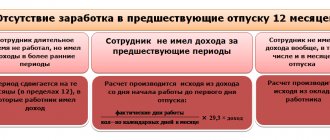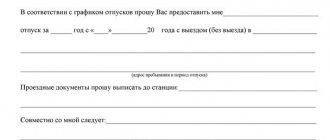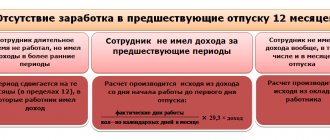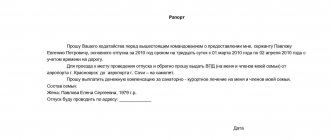Municipal employees are provided with paid leave annually. It consists of main leave (30 calendar days) and additional leave, the duration of which depends on working conditions and length of service in municipal service.
In this article we will tell you how to determine the duration of paid leave for a municipal employee. Let us briefly look at the procedure for determining the amount of salary for the vacation period. In addition, let's talk about unpaid leaves.
Municipal employees are subject to labor legislation, taking into account the specifics provided for by the Law on Municipal Service in the Russian Federation[1], other federal laws and regulatory legal acts of the Russian Federation and constituent entities of the Russian Federation on municipal service (Clause 2, Article 3, Article 11 of the said law) . Thus, the issues of granting and paying for vacations are regulated first of all by special legislation, and then by labor legislation.
In accordance with Art. 21 of the Law on Municipal Service in the Russian Federation, a municipal employee is granted annual leave while retaining the position of the municipal service being filled and salary, the amount of which is calculated in the manner established by labor legislation for calculating the average salary. Annual paid leave consists of:
- from the main paid leave;
- from additional paid vacations.
Annual additional paid holidays.
A municipal employee is provided with the following additional paid leaves:
- for length of service;
- for irregular working hours (if the employee has such a work schedule);
- for working under harmful and (or) dangerous working conditions (if any);
- for work in the Far North and equivalent areas;
- in other cases provided for by federal laws;
- in cases established by the laws of the subject of the Russian Federation.
Let's look at each of these types of vacations separately.
When is a civil servant granted leave?
Annual paid leave is granted to a civil servant after six months of work within the time limits provided for in the vacation schedule. Except in cases where a civil servant has the right to go on vacation regardless of the schedule or the vacation is agreed upon with the employer.
The employer is obliged to notify the civil servant of the start of scheduled vacation no later than 2 weeks before its start (Part 3 of Article 123 of the Labor Code of the Russian Federation).
In some cases, leave may be granted outside the schedule:
- if an employee is hired into the civil service after drawing up a vacation schedule;
- a civil servant wants to take leave before or immediately after maternity leave;
- when a civil servant adopts a child under 3 years of age;
- in other cases provided for by law (Articles 122, 123 of the Labor Code of the Russian Federation).
Long service leave.
The federal legislator has established the maximum duration of additional leave for long service - 10 calendar days. The specific procedure and conditions for granting such leave are determined by the laws of the constituent entities of the Russian Federation. Here are excerpts from some regional laws.
| Name and norm of the document | Procedure for granting leave |
| Clause 5 of Art. 28 of the Law of Moscow dated October 22, 2008 No. 50 “On municipal service in the city of Moscow” (hereinafter referred to as Law No. 50) | The duration of annual additional paid leave for long service is calculated at the rate of 1 calendar day for each year of municipal service |
| Clause 2 of Art. 15 of the Law of St. Petersburg dated February 15, 2000 No. 53-8 “On the regulation of certain issues of municipal service in St. Petersburg” (hereinafter referred to as Law No. 53-8) | In addition to the annual basic paid leave, a municipal employee is granted an additional annual paid leave for long service at the rate of 1 calendar day for 3 full calendar years of municipal service, but not more than 10 calendar days |
| Clause 4 art. 20 Law of the Nizhny Novgorod Region dated 03.08.2007 No. 99-Z “On Municipal Service in the Nizhny Novgorod Region” (hereinafter referred to as Law No. 99-Z) | Municipal employees are provided with annual additional paid leave for length of service lasting: 1) with municipal service experience from 1 to 5 years – 1 calendar day; 2) if the municipal service experience is from 5 to 10 years – calendar days; 3) with municipal service experience of 10 to 15 years – 7 calendar days; 4) with municipal service experience of 15 years or more – 10 calendar days |
If the law of a subject of the Russian Federation or a regulatory act of a municipality does not stipulate the procedure for determining the duration of paid leave for long service, then the rules established by clause 5 of Art. 46 of the Law on the State Civil Service in the Russian Federation[2], since through the correlation of the basic conditions of remuneration and social guarantees of municipal and state civil servants, mutual
connection between the municipal service and the state civil service of the Russian Federation (clause 5 of article 5 of the Law on municipal service in the Russian Federation, clause 5 of article 7 of the Law on state civil service in the Russian Federation). In accordance with this law, the duration of additional leave for long service is:
- with municipal service experience from 1 to 5 years – 1 calendar day;
- with municipal service experience of 5 to 10 years – 5 calendar days;
- with municipal service experience of 10 to 15 years – 7 calendar days;
- with 15 years or more of municipal service experience – 10 calendar days.
Three additional days for irregular work
Some civil servants in 2021 are entitled to an additional 3 calendar days of vacation for irregular work days (Part 6.1, Article 46 of Law No. 79-FZ). Civil servants holding senior and main positions fall into this category.
Other civil servants may also be involved in irregular work and count on additional leave for an irregular working day, if an irregular working day is provided for in their service contract and the position is included in the corresponding list.
Leave for work under harmful and (or) dangerous working conditions.
The Law on Municipal Service in the Russian Federation does not contain special provisions on granting municipal employees additional leave for work under harmful and (or) dangerous working conditions. Consequently, the general provisions established by the Labor Code apply.
Annual additional paid leave is provided to employees whose working conditions in their workplaces, based on the results of a special assessment of working conditions (SAL), are classified as hazardous working conditions of the 2nd, 3rd or 4th degree or hazardous working conditions. The minimum duration of such leave is 7 calendar days. The duration of the annual additional paid leave of a particular employee is established by an employment contract on the basis of an industry (inter-industry) agreement and a collective agreement, taking into account the results of the special labor camp (Article 117 of the Labor Code of the Russian Federation).
Leave for work in special climatic conditions
By virtue of Art. 116, 321 Labor Code of the Russian Federation, art. 14 of the Law of the Russian Federation of February 19, 1993 No. 4520‑1 “On state guarantees and compensation for persons working and living in the Far North and equivalent areas”, in addition to the established additional leaves provided on a general basis, to persons working in the northern regions of Russia , additional annual leave of the following duration is also provided as compensation:
- in the Far North - 24 calendar days;
- in equivalent areas – 16 calendar days;
- in other regions of the North, where the regional coefficient and percentage increase in wages are established, it is 8 calendar days.
According to Art. 313 of the Labor Code of the Russian Federation, additional guarantees and compensation may be established for persons living in the named areas, laws of constituent entities of the Russian Federation, regulatory legal acts of local governments, collective agreements, and agreements.
Other additional leaves provided for by federal legislation
Municipal employees, like other citizens of the Russian Federation, are subject to the provisions of other federal laws providing for the provision of additional paid leave. We are talking primarily about citizens exposed to radiation.
| Category of citizens | Duration of additional leave | Name and norm of the document |
| Citizens exposed to radiation as a result of nuclear tests at the Semipalatinsk test site | 14 calendar days | Clause 15 of Art. 2 of the Federal Law of January 10, 2002 No. 2‑FZ |
| Citizens exposed to radiation as a result of the Chernobyl nuclear power plant disaster | 14 calendar days | Clause 5 of Art. 14 Law of the Russian Federation dated May 15, 1991 No. 1244‑1 |
Filling out the vacation schedule
The vacation schedule for employees of the institution is drawn up according to the unified form T-7, approved by Resolution of the State Statistics Committee of the Russian Federation dated January 5, 2004 N 1. The schedule reflects information about the time of distribution of annual paid vacations for employees of all structural divisions of the organization for the calendar year by month. When compiling it, the provisions of the current legislation of the Russian Federation, the specifics of the organization’s activities and the wishes of employees are taken into account. It is signed by the head of the personnel service and approved by the head of the organization or a person authorized by him, taking into account the reasoned opinion of the elected trade union body (if there is one) of this organization on the priority of granting paid leave.
When the vacation period is postponed to another time, with the consent of the employee and the head of the structural unit, appropriate changes are made to the vacation schedule with the permission of the person who approved the schedule or the person authorized by him to do so. The transfer of vacation is carried out in the manner established by the legislation of the Russian Federation, on the basis of a document drawn up in any form.
Dividing the vacation into parts.
In accordance with Art. 125 of the Labor Code of the Russian Federation, by agreement between the employee and the employer, annual paid leave can be divided into parts. In this case, at least one of the parts must be at least 14 calendar days.
The laws of the constituent entities of the Russian Federation may provide municipal employees with additional guarantees, for example, the possibility of dividing vacation into parts at the request of the employee. Here are excerpts from regional laws.
| Name and norm of the document | Procedure for granting leave |
| Clause 6 of Art. 28 Law No. 50 | At the request of a municipal employee, annual paid leave may be provided in installments. In this case, the duration of one part of the granted leave cannot be less than 14 calendar days. |
| Clause 3 of Art. 15 Law No. 53‑8 | Annual basic paid leave and annual additional paid leave are summed up and, at the request of the municipal employee, can be provided in parts. In this case, the duration of one part of the annual paid leave cannot be less than 14 calendar days. |
Legislative acts
Leaves for citizens in the civil service are determined by Law No. 79-FZ of July 27, 2004. Changes have been made to it in 2021. The duration of rest and accrual were supplemented by Law No. 176-FZ of June 2, 2016.
According to legislative acts, leave is issued under the following conditions:
- Rest time is determined by the schedule drawn up by the organization 2 weeks before the start of the calendar year.
- The vacation can be divided into several parts. Moreover, one of them cannot be shorter than two weeks.
- A civil servant must rest at least 4 weeks per calendar year. If the need arises, he has the opportunity to transfer the part exceeding this time to the next year or receive monetary compensation instead.
An official has the right to take unscheduled leave if there are special reasons for this. For example, when the wife of a civil servant is on maternity leave.
According to legislative acts, in addition to the main vacation, employees involved in the public service can receive additional days of rest. Their number is affected by:
- length of service;
- performing official duties in hazardous conditions;
- irregular working hours;
- service in non-standard climatic conditions.
Calculation of the duration of rest time must be carried out every year, as length of service or other circumstances may change.
Replacement of vacation with monetary compensation.
In accordance with Art. 126 of the Labor Code of the Russian Federation, part of the annual paid leave exceeding 28 calendar days, upon a written application from the employee, can be replaced by monetary compensation. When summing up annual paid leave or transferring annual paid leave to the next working year, monetary compensation can be replaced by a part of each annual paid leave exceeding 28 calendar days, or any number of days from this part.
However, it must be remembered that the replacement of annual additional paid leave granted to persons employed in work with harmful and (or) dangerous working conditions is carried out in a special manner (Article 117 of the Labor Code of the Russian Federation, Letter of the Ministry of Labor of the Russian Federation dated June 27, 2017 No. 14-2/ OOG-5299):
- it is not allowed to replace with monetary compensation the minimum established duration of the annual additional paid leave provided to employees employed in harmful and (or) dangerous working conditions (7 calendar days);
- replacement of additional paid leave exceeding the minimum established duration of such leave (7 calendar days) is possible provided that this is provided for by an industry agreement and a collective agreement, as well as on the basis of the written consent of the employee, formalized by concluding a separate agreement to the employment contract.
It is not permitted to replace annual basic paid leave and annual additional paid leave with monetary compensation:
- pregnant women;
- workers under 18 years of age.
Procedure for granting leave
Annual paid leave is provided according to a schedule drawn up annually by the organization. In this case, the features of its design should be taken into account:
- Leave is granted no earlier than 11 months after joining the civil service. The exception is pregnant women or officials who have transferred from another government agency.
- If during a vacation an official is on sick leave, then the rest period is extended by the same number of days or transferred to any other convenient dates.
- Additional vacation days are provided in addition to the main one.
- Rest time cannot be replaced with monetary compensation. The exception is the dismissal of an employee from a government position.
- Due to operational necessity, the main rest time can be postponed to the next period, but this requires the consent of the official. Part of the rest time must be used no later than 1 year after the right to it becomes available.
- A civil servant cannot fail to take basic leave for 2 years in a row.
Expert commentary
Kamensky Yuri
Lawyer
If an official takes leave without pay, then his position is retained for the entire duration of the leave. Such leave can last from several days to one year if there is a good reason and at the discretion of the employer.
The procedure for calculating vacation pay.
A municipal employee is granted annual leave with retention of salary, the amount of which is calculated in the manner prescribed by labor legislation for calculating the average salary (Article 21 of the Law on Municipal Service in the Russian Federation). According to Art. 139 of the Labor Code of the Russian Federation, for all cases of determining the amount of average wages (average earnings) provided for by the Labor Code of the Russian Federation, a single procedure for calculating it applies. The specifics of the procedure for calculating average wages are established by Decree of the Government of the Russian Federation of December 24, 2007 No. 922 (hereinafter referred to as Regulation No. 922).
For reference
The rules for calculating the salary of federal government civil servants, including the procedure for calculating salary for the period the civil servant is on annual paid leave, are established by Decree of the Government of the Russian Federation of September 6, 2007 No. 562.
Paragraphs 2, 3 of Regulation No. 922 indicate that to calculate average earnings, all types of payments provided for by the remuneration system applied by the relevant employer are taken into account, regardless of the sources of these payments, with the exception of social payments and other payments not related to remuneration ( financial assistance, payment of the cost of food, travel, training, utilities, recreation, etc.).
Let us recall that the work of a municipal employee is paid in the form of salary, which consists (Article 22 of the Law on Municipal Service in the Russian Federation):
- from the official salary of the employee in accordance with the position he fills;
- from the monthly and other additional payments of the employee, determined by the law of the subject of the Russian Federation.
Local governments independently determine the amount and conditions of remuneration for municipal employees. The amount of the official salary, as well as the amount of monthly and other additional payments and the procedure for their implementation are established by municipal legal acts issued by the representative body of the municipality.
Thus, different constituent entities of the Russian Federation (municipalities) have their own rules for determining the amount of salary for municipal employees, so it is difficult to give universal advice on how to determine the amount of vacation pay. Let us highlight only some basic points.
To calculate average earnings, all types of payments provided for by the remuneration system and applied by the relevant employer are taken into account, regardless of the sources of these payments. In accordance with clause 2 of Regulation No. 922, in relation to municipal employees, such payments, in particular, include:
- salary accrued to the employee for time worked (clause “e”);
- allowances and additional payments to official salaries for professional skills, class, length of service, knowledge of a foreign language, work with information constituting state secrets, combining positions, expanding service areas, increasing the volume of work performed, etc. (paragraph “k”);
- payments related to working conditions, including those determined by regional regulation of wages (in the form of coefficients and percentage bonuses to wages), increased wages for heavy work, work with harmful and (or) dangerous and other special working conditions, for work at night, payment for work on weekends and non-working holidays, payment for overtime work (paragraph “l”);
- bonuses and remunerations provided for by the remuneration system (clause “n”);
- other types of wage payments used by the relevant employer (clause “o”).
The amount of salary for the period that a municipal employee is on annual paid leave is calculated as follows:
1) the average daily earnings are determined by dividing the amount of salary actually accrued to the employee for the 12 calendar months preceding the vacation by 12 and by the average monthly number of calendar days (29.3) (clause 10 of Regulation No. 922);
2) the amount of vacation pay is determined by multiplying the average daily earnings by the number of calendar days of vacation.
Accountants often have a question: is it necessary to include this or that payment due to an employee in the calculation of average earnings? Let's look at this question in detail.
Additional payments for vacation. As a rule, when municipal employees go on vacation, they are entitled to additional vacation payments.
| Name and norm of the document | Procedure for granting leave |
| Clause 10 of Art. 20 of Law No. 99-Z | When a municipal employee is granted annual paid leave, a lump sum payment in the amount of two official salaries is made once a year. |
| Clauses 1, 2 of Law No. 50 | Local government bodies independently determine the amount and terms of remuneration for municipal employees, including the amount and procedure for making a lump sum payment for the next annual paid leave |
Let us remind you that clause 3 of Regulation No. 922 establishes that social payments are not accepted into the calculation of average earnings to pay for additional municipal leave. The current legislation does not contain a direct indication of the procedure for taking into account the lump sum payment for vacation when calculating the average salary for a municipal employee. At the same time, the absence of a rule for municipal employees approved by federal legislation does not prevent its establishment by a regulatory legal act of a constituent entity of the Russian Federation.
Material aid. Difficulties also arise with financial assistance. The fact is that in Regulation No. 922, material assistance is classified as social payments, which are not taken into account when calculating average earnings. However, for municipal employees, financial assistance is often included in the wage system and, in fact, is not a social benefit.
An analysis of arbitration practice shows that the majority of judges believe that the above payments should not be taken into account when determining average earnings.
| Document details | Judges' findings |
| Appeal ruling of the Novosibirsk Regional Court dated 04/04/2017 in case No. 33-3195/2017 | A one-time payment when providing leave and financial assistance should not be taken into account when calculating average earnings |
| Appeal ruling of the Supreme Court of the Komi Republic dated February 24, 2014 in case No. 33-834/2014 | Financial assistance for vacation refers to social payments that are not taken into account as part of earnings when calculating average daily earnings |
| Appeal ruling of the Court of the Yamalo-Nenets Autonomous District dated September 10, 2012 in case No. 33‑2190 | A one-time payment when providing annual leave refers to payments of a social nature, since it is not related to the performance of functional duties by a municipal employee, and is not taken into account when calculating average earnings |
To be fair, it should be noted that there are also opposing decisions of the judges. For example, in the Determination of the Rostov Regional Court dated January 26, 2012 in case No. 33-1042, it is stated that since, according to the law of a constituent entity of the Russian Federation on municipal service, financial assistance is paid to an employee as part of additional payments on a monthly basis, it is not a social payment, but refers to the salary of the employee , therefore, should be taken into account when calculating average earnings. We emphasize that there are much fewer such solutions. In any case, when deciding whether to take into account the disputed amounts when calculating average earnings or not, you need to focus on the wording of regional legislation on municipal service regarding the procedure for determining the salary of municipal employees.
In general, the procedure for calculating vacation pay for municipal employees is not much different from the procedure for calculating vacation pay for other employees of state (municipal) institutions. We wrote about this on the pages of our magazine earlier. For convenience, we present these materials in a table.
| Title of article, question | Author of the article, number and year of publication of the magazine |
| “How to calculate average earnings if an employee quits on the last working day of the month?” | M. S. Zvyagintseva, No. 1, 2020 |
| “Transitionable holidays: calculating personal income tax and insurance premiums” | A. O. Egorova, No. 10, 2019 |
| “Leave after maternity leave: how to determine the billing period” | S. V. Manokhova, No. 8, 2019 |
| “Calculation of average earnings for vacation pay” | S. V. Manokhova, No. 7, 2019 |
| “Accounting for payments when calculating average earnings for vacation pay” | V. V. Nikitin, No. 2, 2019 |
Payments for vacation
The basis for calculating vacation pay is Government Decree No. 562 of September 6, 2007. Additionally, the employer’s financial obligations are stipulated in Law No. 79-FZ of July 27, 2004.
Vacation payments are calculated taking into account:
- established salary in accordance with service class;
- salary for the replacement position;
- additional payments received.
Civil servants are entitled to payments that form their wages in addition to their salary. They can be prescribed on various grounds:
- for length of service;
- as financial assistance;
- bonus payments;
- for special or harmful working conditions.
Payment is made in a lump sum. The employee must receive vacation pay no later than 10 days before the start of the vacation. If this point is violated, the employer may be subject to administrative liability. That is why, if an employee wants to take a vacation out of turn, he may be offered to arrange a vacation at his own expense before doing so.
For some categories of civil servants, the procedure for calculating vacation pay includes financial assistance and one-time payments. In general, the amount of funds is calculated using the formula: salary is divided by 29.3 average days and multiplied by the number of vacation days.
Additional guarantees for civil servants
Activities related to public service have certain costs that are subject to compensation. At the same time, costs mean a set of prohibitions and requirements that impose significant restrictions on the lives of civil servants. In Russia, this compensation is guaranteed at the state level: government employees are provided with special benefits and preferences.
Chapter II of Law No. 79-FZ of July 27, 2004 provides a list of compensations. The legislation considers them as state guarantees in order to ensure:
- increasing the service motivation of civil servants;
- social and legal protection of specialists;
- strengthening staffing;
- minimizing corruption.
It is customary to distinguish between a main and an additional group of state guarantees. The main group is intended for all categories of civil servants, the additional group is for specialists from individual regions or government bodies. Among the guarantees are:
- optimization of service procedures;
- establishing scientifically based labor standards;
- ensuring labor protection;
- optimization of work and rest schedules.
Optimization of rest and work schedules is achieved thanks to:
- establishing temporary boundaries of work activity (40-hour work week);
- allocation of holidays and non-working days;
- provision of annual leave, including additional ones.
Who belongs to this category
Despite the existence of such a concept as a civil servant, the concept of the civil service itself is absent in the legislation of the Russian Federation. It simply means that a person classified in this category is engaged in socially beneficial activities on the basis of government orders.
2019 significantly changed the legal and social situation of the civil service, which is associated with an increase in its prestige and authority. But, as noted above, what interests me is not the philosophical and legal aspect, but the more mundane aspects of working in the public service, in particular, the intricacies of work and rest.
The range of professions and civil service positions has remained the same, and part of the reforms is aimed at achieving social equality of these specialists with all other workers, as well as unifying leave procedures throughout the country.
The working time of state civil servants is regulated by:
- Article 45 “Work time and rest time” of the Federal Law of July 27, 2004 No. 79-FZ (as amended on December 2, 2019) “On the State Civil Service of the Russian Federation.
The schedule of service (work) and rest of state civil servants is determined by the official regulations of the state body.
The official regulations of a state body are approved:
- a representative of the employer, taking into account the opinion of the elected trade union body of this state body (if such a body is created and functioning) and
- service contract.
All significant features of the personal schedule of official time of a state civil servant must be reflected in the service contract.
Service time of state civil servants:
- this is the time during which a state civil servant in accordance with:
with the official regulations of a government body or
- with a service schedule or
- terms of the service contract
Part 1 of Article 45 “Work time and rest time” of Federal Law No. 79-FZ “On the State Civil Service of the Russian Federation”
Normal length of service time for state civil servants:
- cannot exceed 40 hours per week ;
- A 5-day work week is established for state civil servants .
The general day off for government civil servants is Sunday. The second day off is determined by the government agency. Based on established practice, the days off for state civil servants are Saturday and Sunday .
Article 111 “Weekends” of the Labor Code of the Russian Federation
An irregular official (working) day is established:
- for state civil servants holding senior and main positions in the civil service;
- For state civil servants filling civil service positions of other groups, an irregular service (working) day is established in accordance with:
with the official regulations of the state body for the corresponding list of positions and
- service contract.
For reference:
State civil service positions are divided into the following groups:
| senior positions of the state civil service |
| main positions of the state civil service |
| leading positions in the state civil service |
| senior positions of the state civil service |
| junior positions of the state civil service |
Article 9 “Classification of civil service positions” of Federal Law No. 79-FZ “On the State Civil Service of the Russian Federation”
Service contract:
- an agreement between a representative of the employer and a citizen entering the state civil service, or a state civil servant on performing the state civil service and filling a civil service position;
- The service contract establishes the rights and obligations of the parties.
State civil servants for whom an irregular service (working) day is established:
- annual additional paid leave is provided for an irregular (working) day of service
- in accordance with Article 46 “Leaves in the civil service” of Federal Law No. 79-FZ “On the State Civil Service of the Russian Federation”.
The right to rest for state civil servants is exercised:
- providing a civil servant with time free from performing official duties (free time)
- outside the limits of the normal length of service time of state civil servants established by the Federal Law on the State Civil Service.
Providing state civil servants with annual paid leave
The right of a state civil servant to annual leave while maintaining the position being filled in the state civil service and salary is secured:
- Part 4 of Article 45 “Work time and rest time”,
- Part 1 of Article 46 “Leaves in the Civil Service” of Federal Law No. 79-FZ “On the State Civil Service of the Russian Federation” and
- Letter of the Ministry of Labor of Russia dated March 21, 2016 No. 18-4/10/B-1771 “On the provision of annual paid leave to state civil servants of the Russian Federation.”
These legislative norms implement the constitutional right of every state civil servant:
- for annual paid leave,
- that is, release from official duties while maintaining his place of work and earnings.
Art. 37 of the Constitution of the Russian Federation
Any agreement between a representative of the employer (employer) and a state civil servant aimed at limiting the right to annual paid leave is contrary to the Constitution of the Russian Federation and labor legislation. |
The procedure for calculating the salary of state civil servants for the period of being on annual paid leave is determined:
- Decree of the Government of the Russian Federation of September 6, 2007 No. 562 (as amended on July 10, 2014) “On approval of the rules for calculating the salary of federal civil servants.”
The annual paid leave of state civil servants consists of:
- from the main paid leave and
- additional paid holidays.
Additional paid leaves for state civil servants are presented:
- additional paid leave for length of service - provided to all state civil servants;
- additional paid leave for an irregular official (working) day - established for state civil servants working the normal length of official (working) hours;
- additional paid leave in connection with difficult, harmful and/or dangerous working conditions - established in connection with the conditions of civil service.
By Federal Law No. 176-FZ of June 2, 2021, the previously existing differentiation of the duration of annual paid leave for state civil servants depending on groups of positions was changed to a single duration of annual paid leave for all state civil servants. |
By virtue of Part 3 of Article 46 “Leaves in the Civil Service” of Federal Law No. 79-FZ “On the State Civil Service of the Russian Federation”, state civil servants:
- annual basic paid leave of 30 calendar days .
Additional paid leave for state civil servants
Duration of annual additional paid leave for long service:
| State civil service experience | Duration of additional leave |
| from 1 year to 5 years | 1 calendar day |
| from 5 to 10 years | 5 calendar days |
| from 10 to 15 years | 7 calendar days |
| 15 years or more | 10 calendar days |
When calculating the total duration of annual paid leave of state civil servants:
- annual basic paid leave is summed up
- with annual additional paid leave for long service.
Non-working holidays falling during the period of annual main or annual additional paid leave are not included in the number of calendar days of leave for state civil servants. |
State civil servants for whom an irregular working day is established:
- annual additional paid leave is provided for an irregular service (working) day lasting 3 calendar days
Irregular official (working) day for state civil servants:
- by analogy with labor legislation, this is a special regime for the work of state civil servants,
- in accordance with which certain state civil servants may, by order of the employer, if necessary, be occasionally involved in the performance of their official functions outside the working hours established for them.
Article 101 “Irregular working hours” of the Labor Code of the Russian Federation
An irregular official (working) day is established:
- for state civil servants holding senior and main positions in the state civil service;
- for state civil servants filling positions in the state civil service of other groups, an irregular service (working) day is established in accordance with the service regulations of the state body for the corresponding list of positions and the service contract.
State civil servants are provided with additional paid leave annually:
- due to difficult, harmful and/or dangerous conditions of the state civil service,
- including in connection with service in areas with special climatic conditions,
in accordance with Article 116 “Annual additional paid leave” of the Labor Code of the Russian Federation.
Additional leave for an irregular working day, as well as in connection with difficult, harmful and/or dangerous conditions of the state civil service:
- are provided in addition to annual paid leave.
The procedure for providing state civil servants with annual paid leave
Part 9 of Article 46 “Leaves in the Civil Service” of Federal Law No. 79-FZ “On the State Civil Service of the Russian Federation” provides for:
- providing state civil servants with annual paid leave
- in accordance with the vacation schedule approved by the employer’s representative.
The Federal Law on the State Civil Service does not determine the procedure for creating a vacation schedule for state civil servants; therefore, in this matter it is necessary to be guided by labor legislation.
In accordance with the Labor Code of the Russian Federation:
- paid leave must be provided to state civil servants annually;
- the right to use paid leave for the first year of work arises for a state civil servant after 6 months of his continuous work in the corresponding position of the state civil service;
- by agreement of the parties, paid leave can be granted to a state civil servant before the expiration of 6 months;
- categories of persons to whom paid leave upon their application must be granted before the expiration of the specified period are determined by part three of Article 122 “Procedure for granting annual paid leave” of the Labor Code of the Russian Federation.
Before the expiration of 6 months of continuous work, paid leave at the request of a state civil servant must be granted to:
- women before or immediately after maternity leave;
- employees who have adopted a child (children) under the age of 3 months;
- in other cases provided for by federal legislation.
Vacation schedule for state civil servants
According to Article 123 “The order of provision of annual paid leave” of the Labor Code of the Russian Federation:
- the vacation schedule for state civil servants is drawn up and approved for the next calendar year no later than 2 weeks before the end of the current calendar year;
- the vacation schedule includes all annual paid vacations due to a civil servant for the current service year,
- and unused days of paid vacation for previous periods may also be included, subject to the provisions of Part 9.2 of Article 46 of Federal Law No. 79-FZ.
When drawing up a vacation schedule for state civil servants for the next calendar year, it is necessary to take into account that:
- the minimum duration of annual paid leave used by a state civil servant in the service year for which annual paid leave is granted cannot be less than 28 calendar days, and
- at least one part of the annual paid leave must be at least 14 calendar days :
- the duration of other parts of the leave and their quantity are determined by agreement between the state civil servant and the employer’s representative (the person authorized by him).
Part 9.1 of Article 46 “Leaves in the Civil Service” of Federal Law No. 79-FZ “On the State Civil Service of the Russian Federation”
Paid leave for the second and subsequent years of state civil service may be provided to a state civil servant:
- at any time of the working year
- in accordance with the vacation schedule established by this government agency.
The vacation schedule is mandatory for both the employer and the civil servant. The state civil servant must be notified of the start time of the vacation, against signature, no later than 2 weeks before its start. |
A service year for the vacation schedule means:
- a time interval equal to a calendar year, calculated from the date of admission to the position of the state civil service (appointment to it) in the relevant state body.
If any periods, by virtue of Part 2 of Article 121 “Calculation of length of service giving the right to annual paid leave” of the Labor Code of the Russian Federation, are not included in the length of service (service) for granting leave:
- then the end of the service year is postponed by the number of days excluded from the length of service (service).
Letter of the Ministry of Labor of Russia dated March 21, 2016 No. 18-4/10/B-1771 “On the provision of annual paid leave to state civil servants of the Russian Federation”
In addition, in the said Letter of the Ministry of Labor it is noted that the Labor Code of the Russian Federation and Federal Law No. 79-FZ “On the State Civil Service of the Russian Federation” provide for the following cases:
- when the annual paid leave of a state civil servant is transferred to another period approved by the leave schedule;
- in this case, the vacation can be postponed:
at the initiative of the employer's representative,
- the state civil servant himself,
- and in cases established by the legislation of the Russian Federation, when circumstances arise beyond the control of the parties.
By decision of the employer’s representative and with the written consent of the state civil servant:
- part of the annual paid leave exceeding 28 calendar days may be transferred to the next service year in the cases provided for in Part 9.2 of Article 46 of Federal Law No. 79-FZ “On the State Civil Service of the Russian Federation”;
- the transferred part of the leave must be used no later than 12 months after the end of the service year for which it is granted.
This is the decision of the employer’s representative to postpone the vacation:
- executed in writing;
- in this case, the transferred part of the annual paid leave must be included in the vacation schedule for the next calendar year, taking into account the fact that it will be used no later than the specified period.
Cash payments to state civil servants for unused vacation
According to a written statement of a state civil servant:
- part of the annual paid leave in excess of 28 calendar days or any number of days from this part of the leave
- may be replaced by monetary compensation.
Payment of salary to a state civil servant for the period of annual paid leave:
- must be done no later than 10 calendar days before the start of the vacation;
Part 10 of Article 46 of Federal Law No. 79-FZ “On the State Civil Service of the Russian Federation”
- if a state civil servant:
payment was not made on time for the period of annual paid leave or
- he was notified about the start time of the vacation later than 2 weeks before it started,
Part 2 of Article 124 “Extension or postponement of annual paid leave” of the Labor Code of the Russian Federation
When a federal civil servant is granted annual paid leave, a lump sum payment in the amount of 2 months' salary is made once a year. |
When providing a state civil servant of a constituent entity of the Russian Federation with annual paid leave:
- once a year a lump sum payment is made in accordance with the legislation of the constituent entity of the Russian Federation.
Cash compensation for all unused vacations is paid to the state civil servant:
- upon termination or termination of a service contract,
- exemption from holding positions in the state civil service and
- dismissal from the state civil service.
According to a written statement of a state civil servant:
- unused vacations may be granted to him with subsequent dismissal,
- except in cases of dismissal from the position being filled and dismissal from the state civil service for guilty actions.
The day of release from the position being filled in the civil service and dismissal is considered the last day of vacation. |
Upon dismissal of a state civil servant due to the expiration of the service contract:
- leave with subsequent dismissal can be granted even when the leave period completely or partially extends beyond the term of the service contract;
- The day of release from the position being filled and dismissal from the state civil service is considered the last day of vacation.
Part 14 of Article 46 of Federal Law No. 79-FZ “On the State Civil Service of the Russian Federation”
Leave without pay for state civil servants
Due to family circumstances and other valid reasons:
- state civil servant upon his written application by decision of the employer's representative
- Leave without pay may be granted for a period of no more than one year ;
- in addition, this leave is granted to a state civil servant in other cases provided for by federal laws;
- During this leave, the state civil servant retains the position he is replacing; he cannot be dismissed at the initiative of the employer’s representative.









